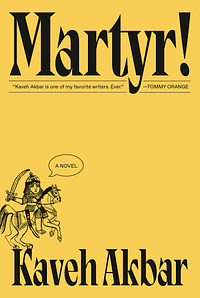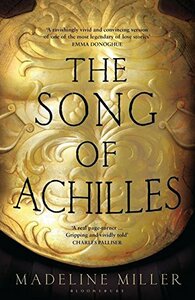Take a photo of a barcode or cover
jonscott9's Reviews (211)
Low-key brilliant poems about everyday topics, depicting the miracles and minutiae of relationships, love, music, parenting, friendship and more. Wise words, some glorious turns of phrase, relevant and timely musings: Those are all here. This was the first time I did poetry-via-audiobook, and Libro.fm's reading by Clint Smith himself was enjoyable. I'm definitely going to do more audio poetry by the author themself, as it seemed to enhance the experience for me. Now, to read more Clint.
I love her voice in every way – singing, speaking, writing, activist-ing. Long live Brandi.
Based on upbringings and experiencres, social and spiritual and familial and so on, I just feel like we are versions of very similar persons, and that our conversations would be fantastic. Obviously I know this way-famous person inside and out so as to say these things. ;-)
Based on upbringings and experiencres, social and spiritual and familial and so on, I just feel like we are versions of very similar persons, and that our conversations would be fantastic. Obviously I know this way-famous person inside and out so as to say these things. ;-)
A lot of "common sense isn't always common" truisms and fine-sounding truths here. Having now read three volumes from the author, I hope that soon enough he will move to expand his repertoire of formats and/or genres and/or topics.
So many superlatives I could use for the experience of reading this book, Kaveh Akbar's first novel. I began with him a few years ago, immersing in his Pilgrim Bell poetry.
The protagonist here, Cyrus Shams, can be wonderful and unkind to his closest persons, and understandably so. It's unfortunately immediately believable to learn (as no one did in American grade-school) that the USS Vincennes shot an Iran Air plane out of the sky in the late 1980s that included Cyrus' mother on the commercial flight. One internalizes a desensitized "yep" to that information without even Googling it, such is the cruel era (over decades) in which we breathe.
Iranian-born Akbar's time teaching at Purdue University (alongside the likes of Roxane Gay) lends him a special source of observation for Cyrus' campus-life foibles with his pal Zee, of Polish-Egyptian background, and others. His dating partners and choices alike can be cringe inducing, and it's all plausible.
The use of first person in some chapters (from the viewpoints of other characters) and third person in others (namely for Cyrus) is an interesting construct, and one that I had the great pleasure of hearing Akbar expound on live.
In January 2025, I saw him speak at a reading/conversation event, and just by chance (walking into the event 30min early) was able to meet him. (His post-event signing had been canceled for logical reasons.) He was refreshing and delightful, even while dealing with a debilitating health matter. He shared that he is writing all the time – probably 98% of it doesn't see daylight – and I could not be more eager for what he publishes next. I'll read everything from him that I can, and strongly recommend checking out his interview in The Believer magazine from 2024.
The protagonist here, Cyrus Shams, can be wonderful and unkind to his closest persons, and understandably so. It's unfortunately immediately believable to learn (as no one did in American grade-school) that the USS Vincennes shot an Iran Air plane out of the sky in the late 1980s that included Cyrus' mother on the commercial flight. One internalizes a desensitized "yep" to that information without even Googling it, such is the cruel era (over decades) in which we breathe.
Iranian-born Akbar's time teaching at Purdue University (alongside the likes of Roxane Gay) lends him a special source of observation for Cyrus' campus-life foibles with his pal Zee, of Polish-Egyptian background, and others. His dating partners and choices alike can be cringe inducing, and it's all plausible.
The use of first person in some chapters (from the viewpoints of other characters) and third person in others (namely for Cyrus) is an interesting construct, and one that I had the great pleasure of hearing Akbar expound on live.
In January 2025, I saw him speak at a reading/conversation event, and just by chance (walking into the event 30min early) was able to meet him. (His post-event signing had been canceled for logical reasons.) He was refreshing and delightful, even while dealing with a debilitating health matter. He shared that he is writing all the time – probably 98% of it doesn't see daylight – and I could not be more eager for what he publishes next. I'll read everything from him that I can, and strongly recommend checking out his interview in The Believer magazine from 2024.
It did no service to this book, a forerunner to Circe, that I had already read that myth take. Miller's writing is better in Circe, with a style of dialogue and language that I found myself mimicking in my everyday life for a week after finishing it.
Song of Achilles has an achy-breaky gay-love awakening that's well handled and honest, and it cycles among Olympian and mortal characters with un-confusing aplomb – no small feat. It just did not move me or envelope me in its story in nearly the same way. Looking forward to what she pens next.
Song of Achilles has an achy-breaky gay-love awakening that's well handled and honest, and it cycles among Olympian and mortal characters with un-confusing aplomb – no small feat. It just did not move me or envelope me in its story in nearly the same way. Looking forward to what she pens next.
Buechner's books are always tender and honest. No character's really ever tapped to play the token villain. All are just people, ordinary and yet extraordinary. This book is no different, and tells the account of young siblings Teddy and Bean and their family in Depression-era America. The book is slim at about 100 pages, but the whole story is compelling. I found the last three pages affecting; it nearly made me cry tears of both happiness and sadness, and I think Buechner wouldn't have it any other way.
What did I learn from this book? That embellishing your life can be okay when you're a great storyteller, no harm's done to anyone, and everyone who reads it knows it's ridiculous and loves you for the constant chuckles.
David Sedaris knows all about timing and spacing. Many of his essays and quips are built around the perfectly turned phrase, the expertly used grammar, and the flat-out zaniness of the subjects. (He's probably not hurting for ammo with a sibling like Amy Sedaris of Strangers With Candy either--oh my!) How two supremely funny people emerged from one stable is beyond me, but let's enjoy Sedaris for all that he's worth.
And that is a lot. One key to humor writing can be self-deprecation, and Sedaris uses it to elicit guffaws at times from his audience. Tales from the school-age crypt ranging from a speech therapist who laughed at his lisp to taking music lessons from a midget are chuckle-inducing throughout, if periodically sad. But isn't that the mark of a grand comedian? I think it's Robin Williams who said that "Behind every comedian there lies a very sad man"--and he was right.
Sedaris is at his best when making light of (and shedding light on) France and its people, its culture, and its language. Anyone who's ever taken a couple semesters of French will chortle at the nuggets that Sedaris offers from his days in class in France itself.
Some built-up quips and narratives seem to stray, and others such as the pieces about Sedaris as a moving-van worker in New York City are mildly funny, but the book on the whole is worth the time of one who's wondered what all the fuss is about with this writer. Augusten Burroughs should consider himself fathered by this funnyman.
David Sedaris knows all about timing and spacing. Many of his essays and quips are built around the perfectly turned phrase, the expertly used grammar, and the flat-out zaniness of the subjects. (He's probably not hurting for ammo with a sibling like Amy Sedaris of Strangers With Candy either--oh my!) How two supremely funny people emerged from one stable is beyond me, but let's enjoy Sedaris for all that he's worth.
And that is a lot. One key to humor writing can be self-deprecation, and Sedaris uses it to elicit guffaws at times from his audience. Tales from the school-age crypt ranging from a speech therapist who laughed at his lisp to taking music lessons from a midget are chuckle-inducing throughout, if periodically sad. But isn't that the mark of a grand comedian? I think it's Robin Williams who said that "Behind every comedian there lies a very sad man"--and he was right.
Sedaris is at his best when making light of (and shedding light on) France and its people, its culture, and its language. Anyone who's ever taken a couple semesters of French will chortle at the nuggets that Sedaris offers from his days in class in France itself.
Some built-up quips and narratives seem to stray, and others such as the pieces about Sedaris as a moving-van worker in New York City are mildly funny, but the book on the whole is worth the time of one who's wondered what all the fuss is about with this writer. Augusten Burroughs should consider himself fathered by this funnyman.
Robinson's prose is elegant and simple. Her characters are the same. John Ames reminded me of a 77-year-old Congregationalist minister version of Atticus Finch. It's set up as a 240-page letter from Ames to his 7-year-old son by a much younger wife who Ames married late in his own existence. If this doesn't sound fantastic, trust me, you don't want to miss the beauty of this book. I can't do it the slightest justice. It's just gripping.
And it won a Pulitzer if that does it for you.
Opening line:
"I told you last night that I might be gone sometime, and you said, Where, and I said, To be with the Good Lord, and you said, Why, and I said Because I'm old, and you said, I don't think you're old."
And it won a Pulitzer if that does it for you.
Opening line:
"I told you last night that I might be gone sometime, and you said, Where, and I said, To be with the Good Lord, and you said, Why, and I said Because I'm old, and you said, I don't think you're old."
Imaginative and thoughtful. Lewis embarks on a bus trip between hell and heaven and witnesses a number of interactions between transparent "ghosts" (those traveling from hell) and "bright spirits" (those residing in heaven). Some of the confrontations between these people (they do have bodies) are quite affecting and thought-provoking, especially in the situations of the dwarfish man and the woman, and the man with the lizard on his back.
Lewis also encounters the Teacher (George MacDonald, whose own Phantastes catalyzed Lewis's spiritual birth), who stays with him for the latter half of the book. Their conversations are of exceptional depth.
I could probably read one 6- or 7-page chapter of this book at a time and ponder its themes and subjects for a week afteward.
This dialogue-heavy, dialogue-rich read is well worth it.
Lewis also encounters the Teacher (George MacDonald, whose own Phantastes catalyzed Lewis's spiritual birth), who stays with him for the latter half of the book. Their conversations are of exceptional depth.
I could probably read one 6- or 7-page chapter of this book at a time and ponder its themes and subjects for a week afteward.
This dialogue-heavy, dialogue-rich read is well worth it.
Alternately heartwarming and heartbreaking. This is Buechner's fourth memoir, and no, that's not too much in light of his 80 or so years, life experiences, and body of work. He touches on so many subjects -- his friendship with the late poet James Merrill, his family tragedy, some of his great works, and the life well lived. The touch Buechner gives whatever he is writing about is the most gentle and yet most searing touch I have encountered in literature. I love to read him when I am in need of calm in my own life.









